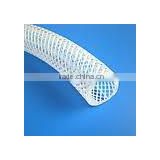Specifications
tensile strength : 35~62
Shrinking rate: 0.3~0.8
Water aborption: 0.2~0.45
Linear expansivity: 8
What is ABS?
Acrylonitrile butadiene styrene (ABS)is a common thermoplastic. Its glass transition temperature is approximately 105 °C (221 °F).ABS has no true melting point.
ABS is stronger than pure polystyrene. shiny, impervious surface, good resilience even at low temperatures. light weight, high stability and electrical capability.good flexility.it is also can be made into transparent. ABS can be used between −20 and 80 °C (-4 and 176 °F) as its mechanical properties vary with temperature.
Features of ABS:
- tensile strength : 35~62
- Shrinking rate: 0.3~0.8
- Water aborption: 0.2~0.45
- Linear expansivity: 8
- Density: 1.05
- Bending Strenght:: 69
- Compressive Strength: 69
- elongation at break: 3~60
- Hardness: Rockwell 65~115
ABS extrusion tube





Applications:
- drain-waste-vent (DWV) pipe systems,
- musical instruments (recorders, plastic clarinets, and piano movements),
- golf club heads (due to its good shock absorbance),
- automotive trim components, automotive bumper bars,
- medical devices for blood access,
- enclosures for electrical and electronic assemblies,
- protective headgear, whitewater canoes,
- buffer edging for furniture and joinery panels,
- luggage and protective carrying cases,
- small kitchen appliances, and toys, including Lego bricks.
- commonly used in rapid prototyping extrusion-based 3D printers. Its glass transition temperature is high enough to reduce unwanted deformation at slightly elevated temperatures but low enough to be safely attainable with standard extrusion setups.
Our advantages:
- We are factory/manufacturer in China.
- We customize plastic profile product for more than 10 years,
- We have our own mould making department, rapid operation line from design to mold support and samples.


